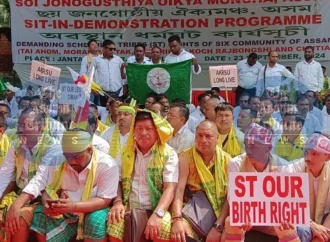Over 3,300 Families, Mostly Bengali-Origin Muslims, Displaced in June–July Eviction Drive A fact-finding report released in New Delhi has termed the recent evictions in Assam as illegal and discriminatory, claiming they were targeted at a specific community. The findings were presented at an event organised by the Association for Protection of Civil Rights (APCR) at
Over 3,300 Families, Mostly Bengali-Origin Muslims, Displaced in June–July Eviction Drive
A fact-finding report released in New Delhi has termed the recent evictions in Assam as illegal and discriminatory, claiming they were targeted at a specific community. The findings were presented at an event organised by the Association for Protection of Civil Rights (APCR) at the Constitution Club of India on Tuesday.
Thousands of Families Evicted in Assam
Between June and July 2025, more than 3,300 families—mostly Muslims of Bengali origin—were evicted from forest lands, grazing fields, and government revenue areas in Assam. The large-scale operation left thousands homeless and raised serious questions on human rights violations.
Fact-Finding Team Visits Affected Districts
A seven-member delegation visited Goalpara and Kamrup districts of Assam on August 23–24 to assess the ground situation. The team included:
-
Harsh Mander (activist)
-
Prashant Bhushan (senior lawyer)
-
Jawhar Sircar (former Rajya Sabha MP)
-
Syeda Hameed (former Planning Commission member)
-
Wajahat Habibullah (former Chief Information Commissioner)
-
Ritumbra Manuvie (researcher)
-
Fawaz Shaheen (researcher)
The group documented the hardships faced by evicted families, many of whom were long-time residents depending on agriculture and small-scale work for survival.
Key Concerns Raised in Report
The report highlighted the following issues:
-
Evictions violated legal procedures and ignored rehabilitation norms.
-
Displacement was community-specific, disproportionately affecting Bengali-origin Muslims.
-
Families were evicted without proper notice, compensation, or alternative housing.
-
The eviction drive has created a humanitarian crisis, worsening poverty and insecurity.
Wider Implications
Civil rights groups argue that such eviction drives in Assam are part of a larger pattern of exclusion targeting marginalized communities. Activists have urged the government to halt forced evictions, ensure legal due process, and provide rehabilitation support for displaced families.
Key Takeaway
The Assam eviction report strongly criticizes the state’s actions, calling them unlawful and discriminatory. With over 3,300 families displaced, the issue has now become a major national concern on human rights, communal targeting, and displacement policies in India.

















Leave a Comment
Your email address will not be published. Required fields are marked with *